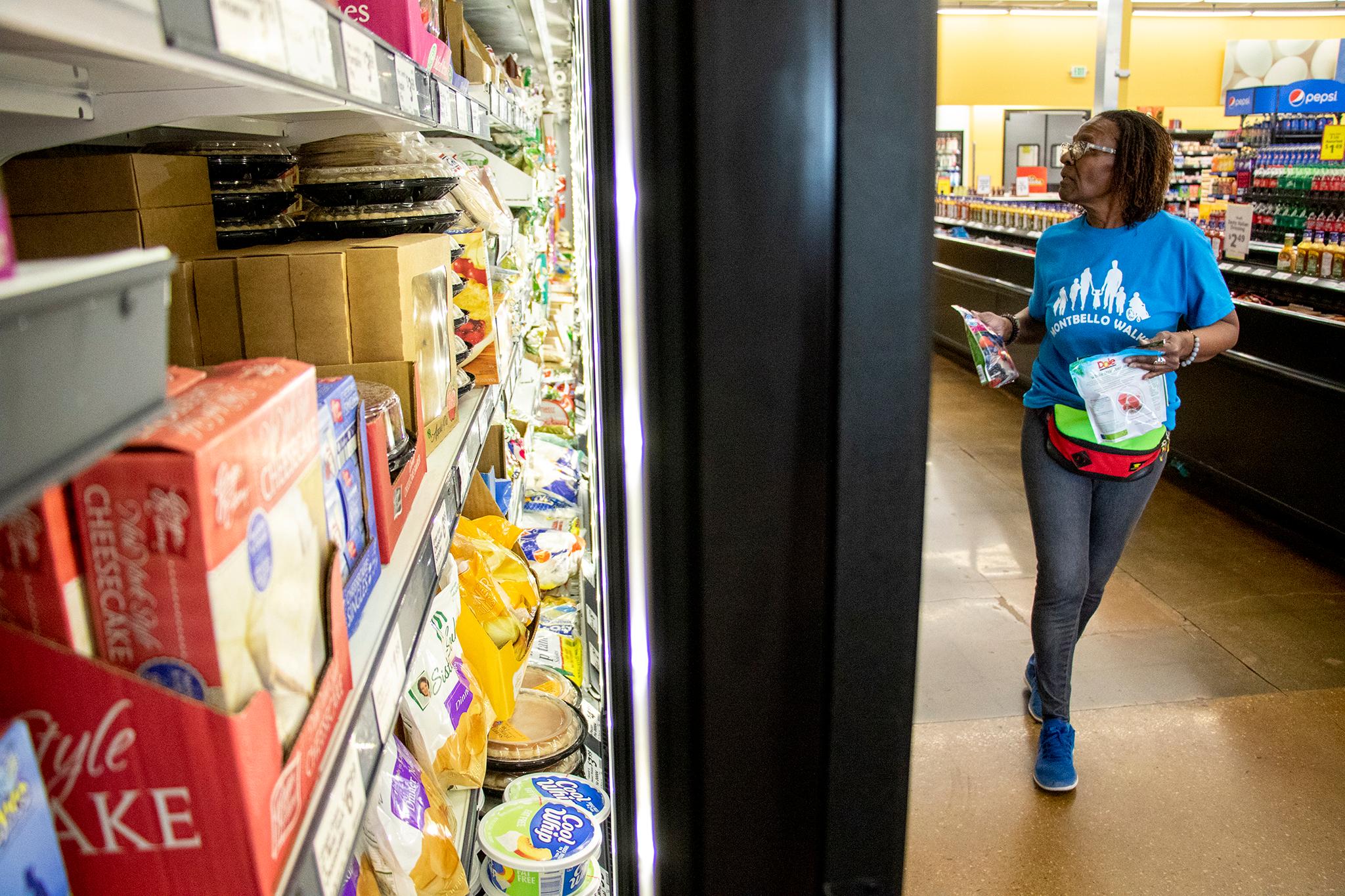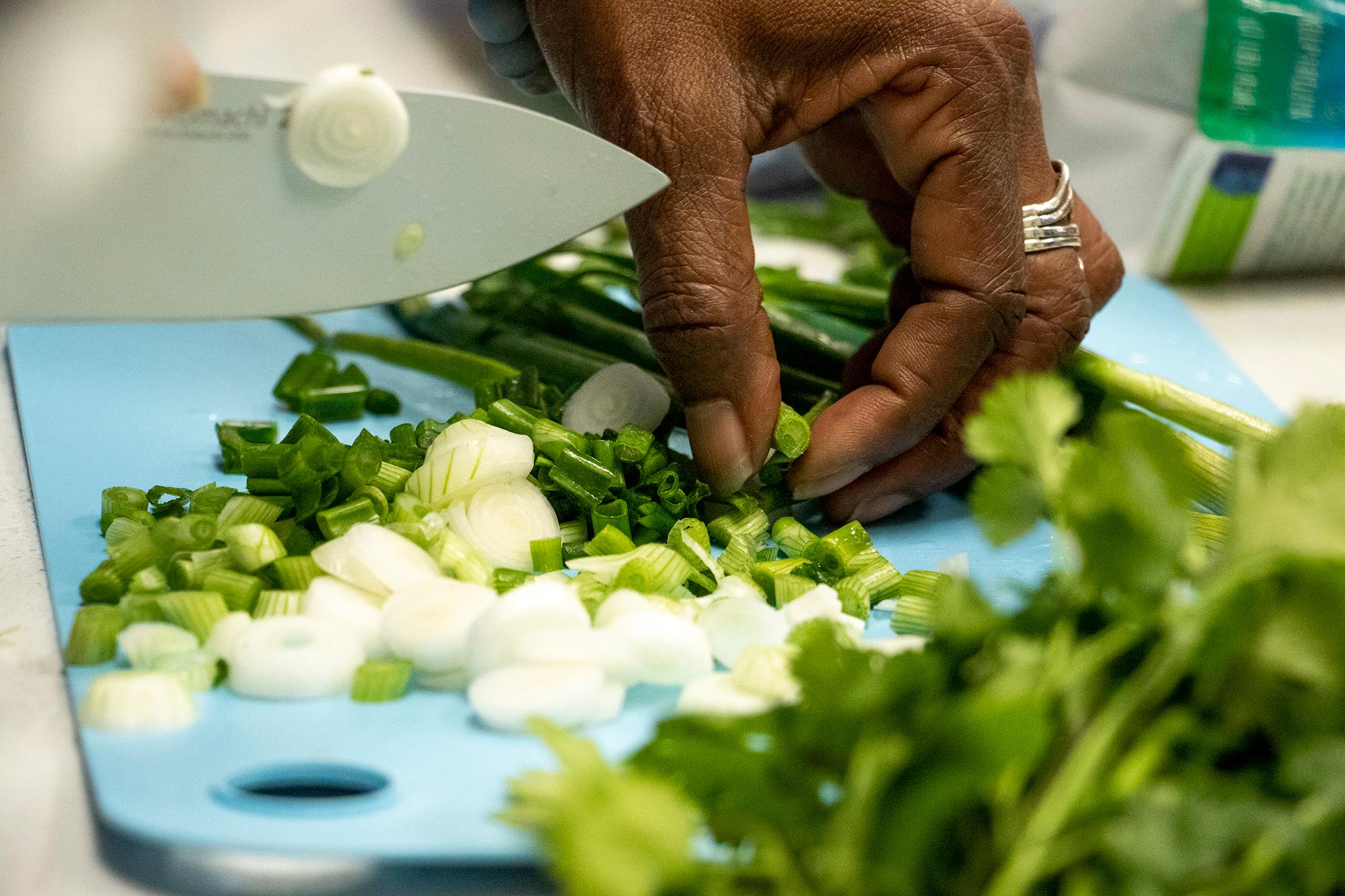Walking was the first tool Pam Jiner used to build health and community in Montbello.
Jiner, known for pushing city officials to improve sidewalks and other pedestrian infrastructure in the neighborhood she's called home for 45 years, now has added food. At lunch time on the second and fourth Thursdays of the month since January, she's been running a cooking club at the Save-A-Lot on Chambers with residents from Montbello Manor, a Volunteers of America affordable housing complex for people 62 years and older.
Jiner transports the men and women in a van she is able to use because of help from Northeast Transportation Connections. The nonprofit works with the Colorado Department of Transportation to address mobility challenges in under-served neighborhoods like Montbello that have felt the effects of the Interstate 70 expansion project.
Once at the store, whose manager Jiner persuaded to offer a 10 percent discount to all seniors on Thursdays, the Senior Steppers check out the fresh produce, a luxury in food-insecure Montbello. Then they gather in a community room in the store that has a food preparation counter, sink, stove and microwave oven. Jiner said the room is better equipped than she had hoped when she helped ensure the facility was included when Save-A-Lot moved into a former Safeway in late 2017. Save-A-Lot's neighbors in a strip mall include a Planet Fitness, a liquor store and a nail salon.


Thursday, 71-year-old Yue Minzhang smiled as Jiner beckoned her to the kitchen island to chop an apple for a fresh fruit and vegetable smoothie. Minzhang said she doesn't consider herself much of a cook, "but I like to do everything with her," referring to Jiner.
The outings were also an alternative to staying at home, which Minzhang said was "too boring."
"I want to visit new places and make new friends," she said. "Now I'm learning to play cards with a few of these people."
This Thursday's menu was Jiner's own, including a taco recipe she "stole" from her neighbor of 35 years. Previous lunches have included a family guacamole recipe from a Mexican-American member of Jiner's senior group. Chinese immigrants once contributed a ginger chicken recipe. And then there was that Nigerian dish.
"The African sisters did something with spinach and fish," Jiner said. "My God it was good! And it was so funny, they had everybody eating with their fingers.
"It was so satisfying. It just satisfied their souls."
"We try to do everything fresh," Jiner said. "They can make a meal by putting good stuff together."
Bringing people together has been Jiner's goal since she set out on a path that has made her a community activist. That was in 2010, when Jiner found herself with time on her hands for the first time in decades. She had raised 13 children, 11 of them foster kids. A foster son she had adopted had just started going to school for the full day, and the two boys to whom she had given birth were adults.
She looked around at a neighborhood she felt had changed drastically since she was a little girl riding her bike along its wide streets and the open drainage canals for which the area is known.


Jiner is black, as she remembers most of her neighbors being when she was a child. Today, the area is heavily Hispanic. She found people were more guarded, less likely to greet one another on the streets, perhaps because of language barriers.
She stumbled upon a national organization called GirlTrek, founded in 2010 by two black women in Los Angeles who wanted to encourage their peers to get out and walk in their neighborhoods to improve personal mental and physical health and strengthen social ties.
It looked like something Montbello could use. In addition to the social stresses Jiner had observed, physical health is a concern in the far northeast Denver neighborhood where 21 percent of the population lives below the poverty line, compared with 14 percent in Denver as a whole. According to city figures, Montbello's childhood obesity rate is 21 percent, compared to a citywide average of 16 percent for that key overall health indicator. Nearly 90 percent of Montbello residents live at least a quarter mile from a grocery store, placing it near the bottom third of Denver's 78 neighborhoods when it comes to food access. Montbello has poor bus service and no train service, so residents need cars to get to the grocery stores that they do have.
"It's a big problem, the lack of transportation," said Ann White, who chairs Montbello 2020, a registered neighborhood organization.
City planners found in interviews with area residents that they fiercely wanted "better access to fresh, healthy affordable food in their neighborhoods.

"The need for more full-service grocery stores was perhaps the single most common piece of feedback that was given in the entire planning process," the planners said in a city report. "Far Northeast residents clearly voiced their concern about the number of fast food restaurants selling unhealthy, overly processed foods and the overabundance of liquor stores in their neighborhoods."
Jiner couldn't do much to influence far-away corporations deciding where to locate their stores and fast-food outlets. But she could encourage Montbello residents to take some aspects of their health into their own hands. She joined GirlTrek in late 2016, encouraging her neighbors to walk with her once a week for 30 minutes.
Nationally, GirlTrek's "goal is to have a million women walking, reconnecting to our communities, taking charge of our communities," Jiner said. "You start healing inside when you exercise."
She estimates she has close to 200 regular walkers in Montbello. In 2017, GirlTrek named Jiner Organizer of the Year.
GirlTrek also connected her to training to help her address larger issues of pedestrian access and safety. Jiner was soon leading journalists, local politicians and city and state officials on walks to draw attention to -- and get action on -- Montbello's lack of sidewalks and curb cuts and its abundance of unsafe intersections.
Her MontbelloWalks program takes the Senior Steppers of Montbello Manor to other outings in the community as well as to cook at Save-A-Lot.
"I'd like to see us be more community," Jiner said. "More helpful. Reach out to each other."














